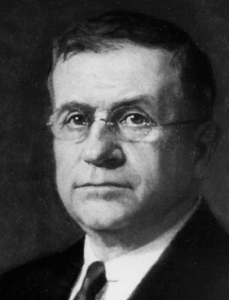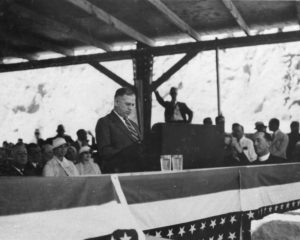The longest serving Secretary of the Interior in our nation’s history was Harold LeClaire Ickes, born on March 15, 1874 (died 1952). He served throughout the presidential tenure of Franklin Delano Roosevelt, from 1933 to 1946, one of only two cabinet secretaries who lasted as long in office as Roosevelt himself.

Ickes was born in Altoona, Pennsylvania, but moved as a teenager to Chicago with his family. With undergraduate and law degrees from the University of Chicago, he practiced law and entered the political scene in his adopted hometown. He was a liberal Republican, with strong commitment to civil rights and social justice, often taking such cases without pay. He was the president of the Chicago chapter of the NAACP and fought throughout his life for equality of African Americans.
Ickes was an avid outdoorsman. A horse-back trip to Glacier National Park in 1916 solidified his commitment to the natural environment. He told a radio audience in 1934, “I love nature. I love it in practically every form—flowers, birds, wild animals, running streams, gem-like lakes and towering, snow-clad mountains.”
Roosevelt chose him as Interior Secretary in 1933, wanting to add a Republican—but a liberal one—to his cabinet. Ickes immediately transformed the Interior Department from a corrupt and ineffective agency, rife with scandal and bribery, into the modern agency we know today. He was so conscientious about avoiding waste and graft that he became known as “Honest Harold.”
He sought preservation of national treasures by expanding the national park system, but also recognized the necessity of using natural resources by building dams on great rivers, including Grand Coulee Dam on the Columbia. During the Dust Bowl, he led the formation of the Soil Conservation Service and the Grazing Service, both designed to restore the ecosystems of the Great Plains (learn more about the Soil Conservation Service here) .

Sensing Ickes’ capabilities, Roosevelt also put him in charge of the Public Works Administration, the New Deal agency created to pry America out of the Great Depression by providing millions of jobs to carry out civic projects. Under Ickes leadership, the PWA completed tens of thousands of projects across the country, including building roads, cabins, visitors centers and camp grounds in more than 800 parks. During his tenure leading the PWA, he oversaw $5 billion in spending, with never a hint of waste or scandal.
His personal life, however, was not as lily-white as his public life. He was purportedly unfaithful to his wife and harsh, perhaps abusive, to his children. He suffered from chronic insomnia, making him irritable in both private and public settings. He took no prisoners in political or policy debates. His willingness to engage in controversy earned him the nickname as Roosevelt’s “liberal lightning rod.”
References:
Biles, Roger. 1996. Review of Roosevelt’s Warrior: Harold L. Ickes and the New Deal. Humanities and Social Sciences online. Available at: http://www.h-net.org/reviews/showrev.php?id=506. Accessed March 12, 2018.
Eleanor Roosevelt Paper Project. Harold LeClaire Ickes (1874-1952). George Washington University. Available at: https://www2.gwu.edu/~erpapers/teachinger/glossary/ickes-harold.cfm. Accessed March 12, 2018.
Encyclopedia Britannica. 2018. Harold L. Ickes. Available at: https://www.britannica.com/biography/Harold-L-Ickes. Accessed March 12, 2018.
ExplorePAhistory.com. Harold L. Ickes [Environment] Historical Marker. Available at: http://explorepahistory.com/hmarker.php?markerId=1-A-342. Accessed March 12, 2018.
Outside Magazine. 2013. A History of the Department of the Interior. Available at: https://www.outsideonline.com/1859351/history-department-interior. Accessed March 12, 2018
